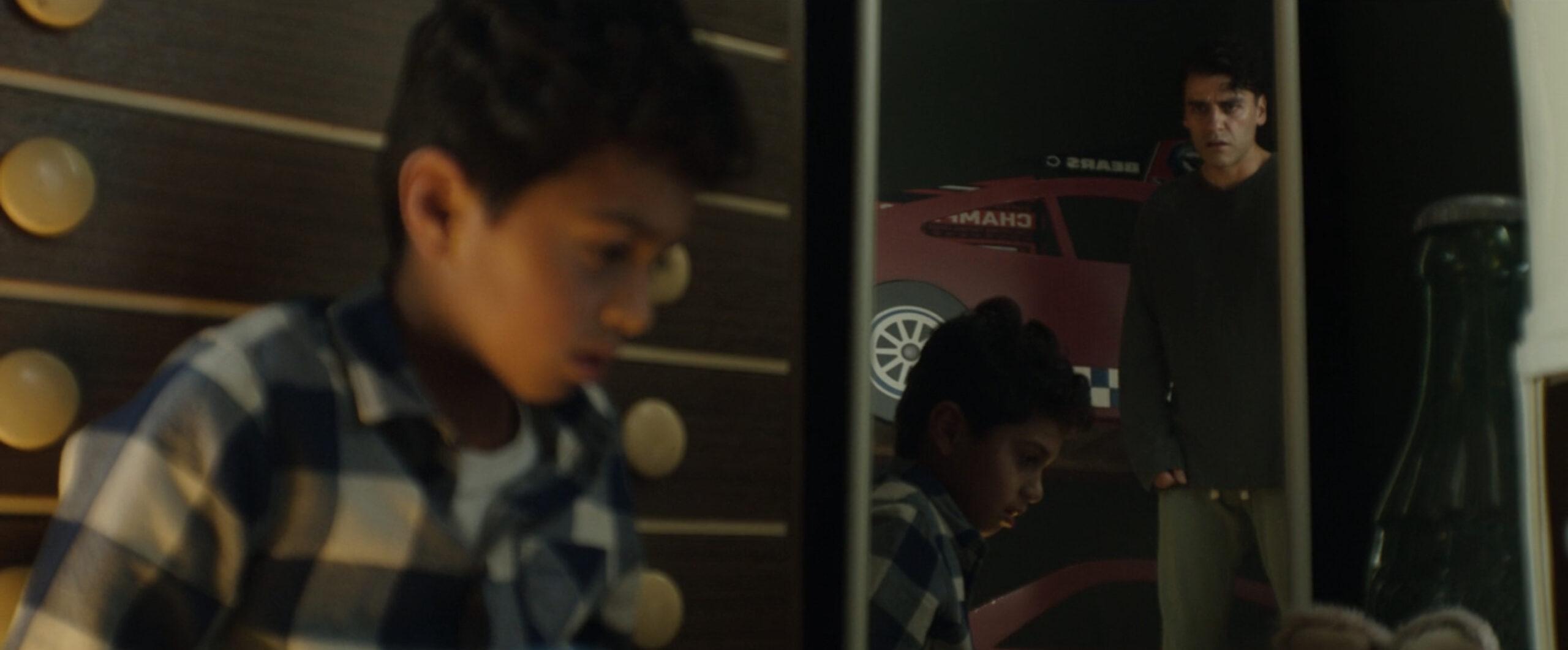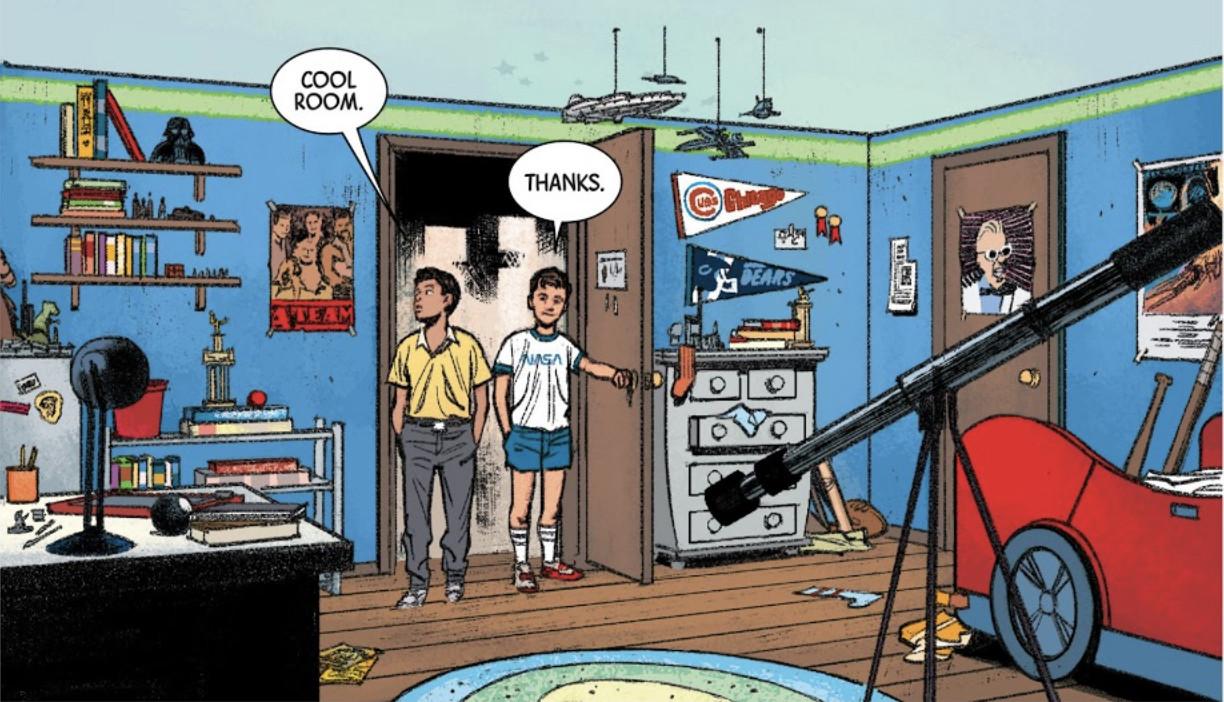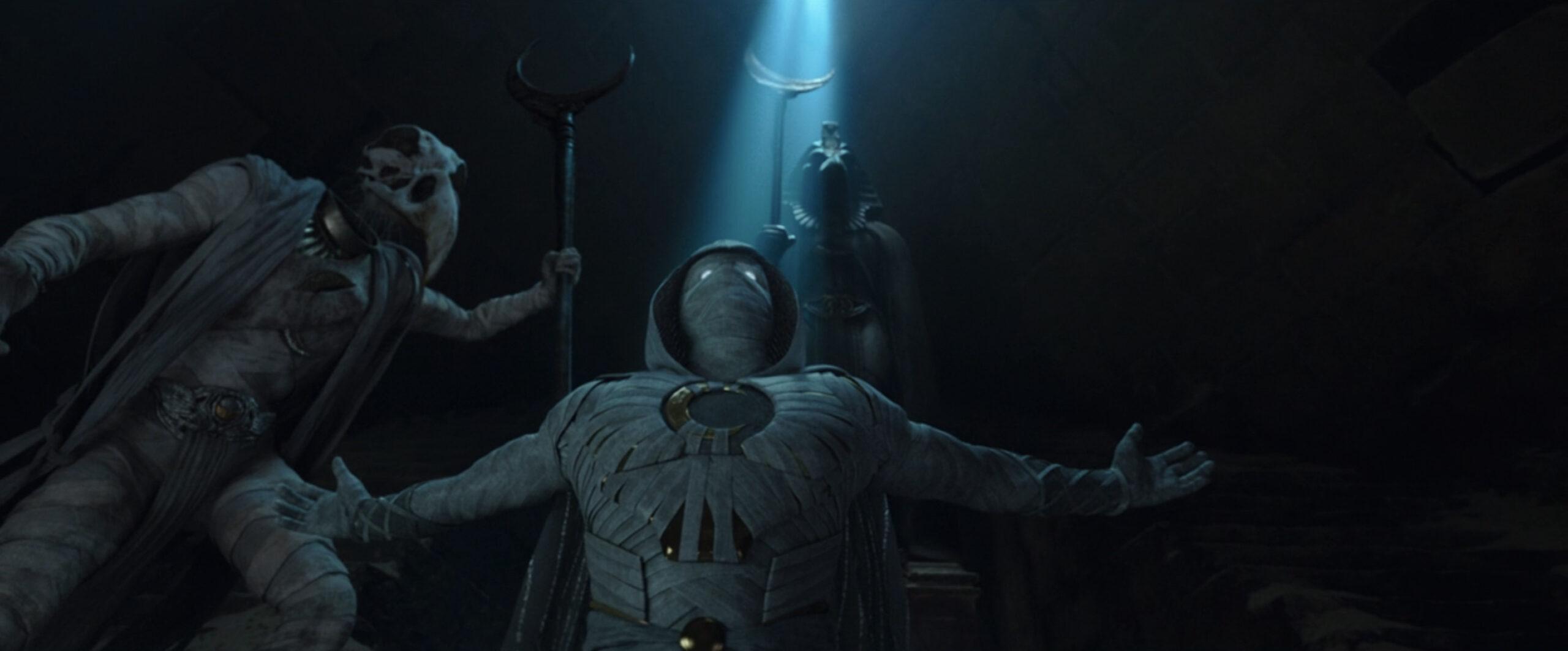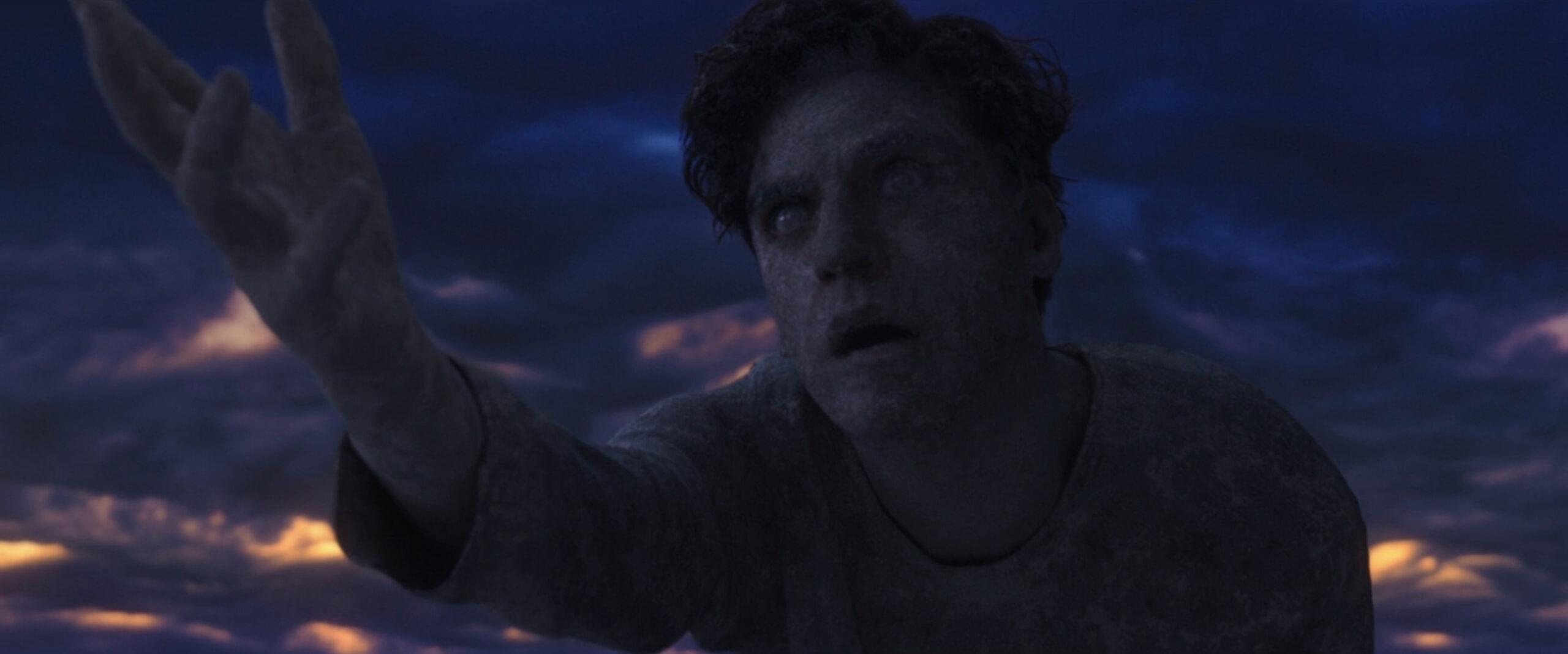
“Do you think you created Steven to hide from all of the awful things you feel you’ve done in your life, or do you think Steven created Marc to punish the world for what your mother did to you?”
Dr. Arthur Harrow asks Marc Spector this question midway through the fifth episode of Moon Knight, in which Marc is forced to confront his traumatic past and the series finally delves into its protagonist’s mental illness. Last week’s action-packed installment featured a major shift for the show after Marc seemingly died in Ammit’s tomb, with Marc and Steven winding up in a psychiatric hospital in separate bodies. In “Asylum,” the duo finds out that they are, in fact, dead, and are now awaiting judgment in the afterlife. But like everything else in Moon Knight, what’s real or not isn’t always so easy to discern. “Your mind is violently vacillating between sense and nonsense,” Dr. Harrow explains to Marc. “Picture this, all right? Your brain is a pendulum, swinging between a very difficult reality—that you are my patient here at Putnam Medical Facility in Chicago, Illinois—and a reassuring fantasy that you’ve created on your own.”
Moon Knight’s penultimate episode hops between Marc’s repressed memories, his transition to the afterlife, and his attempts to make sense of it all with the dubious aid of his newfound psychiatrist in Harrow. “Asylum” is reminiscent of WandaVision’s penultimate episode, which similarly saw Agatha Harkness and Wanda Maximoff stepping through doorways into Wanda’s past, including one that led to the deaths of her parents in Sokovia when she was only a child. But while WandaVision took a journey through Wanda’s memories en route to the reveal of her new title as the Scarlet Witch, Moon Knight uses the narrative device as a means of unveiling the roots of Marc’s dissociative identity disorder.
Through the first four installments of Moon Knight, the show’s perspective belonged largely to Steven, with the details of Marc’s past parceled out in small doses (and often only through conversations Steven conducted with other characters, including Layla). The fifth episode serves as an earnest introduction to Marc Spector, including his Jewish heritage, his family, and how he eventually became Khonshu’s servant. Its exploration of Marc’s trauma, from the death of his younger brother to the abuse he faced from his mother, makes it one of the darker chapters in the MCU’s extensive history, and one that is elevated by Oscar Isaac’s gripping and emotional performance—in two roles that play off each other for the majority of the episode, no less.
“Asylum” is a heavy episode, with rare moments of levity supplied by Steven’s ever-entertaining quips, as well as the charmingly awkward CGI hippo that guides Marc and Steven through their confusing journey into Duat, the Egyptian afterlife. (As Taweret reminds Marc, though, it isn’t the afterlife, just one version of it; in a nod to Black Panther, Taweret explains that there are many forms of transitory planes for the untethered consciousness, like the Ancestral Plane.) Moon Knight continues to weave Egyptian mythology into its plotlines and the fabric of its world: While Harrow begins to unleash Ammit’s fatal judgment upon humanity, Marc and Steven must face judgment of their own lives as their hearts are weighed on the Scales of Justice. Its verdict decides whether their souls will pass on to paradise in the Field of Reeds or remain in eternal damnation.
There’s only one episode left in Moon Knight, and the series has a lot of ground still to cover. Before we look ahead to the season finale, though, let’s examine Marc’s past and how he became Moon Knight.
Marc Spector’s Past and the Truth About Steven Grant

Throughout Moon Knight, Marc has guarded the details of his past, withholding his history of mental illness from even his wife. With Steven again serving as our eyes in the fifth episode, we witness Marc’s tragic core memories, beginning with the death of his brother Randall. On that fateful day, a young Marc led Randall to play in a cave near their home in Chicago, and—despite Randall’s reminder of their mother’s warnings—they continued to venture into its depths after it started to rain. Randall drowned in the overflowing cave, and their mother, Wendy, never forgave Marc for it, even blaming him in front of all the family’s guests when they sat shiva. In the years thereafter, Wendy continued to tell Marc that his brother’s death was all his fault, going so far as beating him while calling him things like a “disgusting human” (reminiscent of Khonshu’s put-downs of Steven) until Marc couldn’t take anymore.
For Steven, the discoveries of Marc’s past come at a cost, as he sees the moment that Marc took a fictional character named Steven Grant—the hero archaeologist from Tomb Buster—and turned him into an alternate personality who could serve as an escape and a coping mechanism. “You’re not meant to see that, that’s the whole point of you,” Marc tells Steven as he pulls them out of the memory.
“The point of me?” Steven replies, after delivering a weak punch to Marc’s face. “What, to be your stress ball? All this time I thought I was the original, but I’m just something that you made up.”
Although Steven feels betrayed by Marc’s withholding the truth, Marc reminds Steven that he got to live his life in blissful ignorance, believing that his mother always loved him. (The very first scene that features Steven in the series found him leaving a cheery voicemail to his mom, something he does several times in the first couple of episodes.) Steven didn’t even know that their mother had died two months before the events of Moon Knight, and Marc explains that his trip back to Chicago for her shiva marked the moment that their shared lives began bleeding into each other. Marc could no longer withstand the pain on his own, so he turned to his only form of escape: Steven.
In my previous Moon Knight recaps, I’ve covered some of the inspirations and departures the Disney+ series has taken from the comics, and “Asylum” is another great example of how head writer Jeremy Slater and the rest of the creative team have borrowed concepts while inserting their own ideas. Jeff Lemire and Greg Smallwood’s standout Moon Knight series features flashbacks to Marc’s childhood, and the TV show even pays homage to the design of Marc’s bedroom and one of the jackets he wears in the comics.

But the comic doesn’t include the death of his brother and the subsequent dissolution of his relationship with his mom. Dissociative disorders usually develop as a means of coping with trauma, often forming in children who have been exposed to long-term physical, sexual, or emotional abuse. Lemire and Smallwood’s series lays out the blueprint for the Disney+ show, but Moon Knight takes this crucial step of adding the traumatic loss of Marc’s brother and the physical and emotional abuse he suffers at the hands of his mother. The series has had its flaws, but storytelling choices like these have helped build a compelling origin story for a character with a complicated and inconsistent comic-book history.
Becoming Moon Knight

In the midst of Marc and Steven’s journey through Marc’s past, they make a stop in Egypt on the day that Marc became Moon Knight.
As early as the second episode of the series, Harrow and his followers planted the idea in Steven’s mind that Marc was a mercenary who executed a group of archaeologists at a dig site. Last week’s installment built upon this backstory by revealing that one of those archaeologists was Layla’s father, and that even though Marc didn’t kill Abdullah himself, he was the one who led his partner to him. “Asylum” brings Steven and Marc to the aftermath of those killings, and Marc finally explains in full what happened: After being discharged from the military, Marc began working for his former commanding officer, Bushman, and a job to raid an Egyptian tomb went awry when Bushman changed the plan and decided that there could be no witnesses left at the scene. Marc nearly died after a failed attempt to lead the archeologists to safety, and he would have perished had it not been for Khonshu’s intervention.
The memory sheds some light on Marc’s role in Abdullah’s death, but perhaps more importantly, we get to see how Marc came into Khonshu’s service, and how the moon deity took advantage of a dying man who’d already been suffering for years. As Marc bleeds out on the footsteps of his temple, Khonshu asks him: “Do you want death or do you want life?”
“I don’t know,” he replies, while staring down the gun in his hand.
“Your mind, I feel it,” Khonshu says. “Fractured. Broken. Most fascinating. You are a worthy candidate to serve me during this time. In exchange for your life, do you swear to protect the travelers of the night, and bring my vengeance to those who would do them harm?”
As Harrow speculated earlier in the season, Khonshu chose Marc in part because of his “fractured” mind, and Khonshu’s manipulations started from the moment Marc entered his temple. With Steven left behind in the Duat by the end of the episode, Marc is alone with only the hope that Taweret can help free the imprisoned Khonshu, assuming Osiris lets him return to the natural world. (No big deal, right?) Resurrection probably sounds pretty nice after having to fight off ghouls and relive your worst experiences, but as Taweret suggests herself, does Marc really want to return to Khonshu’s service? (Yes, of course he does, but, man, couldn’t the pigeon be more like this lovely hippo god?)
What’s Next on Moon Knight

Within the first six minutes of the Moon Knight premiere, Steven Grant and a little girl at the British museum foresaw what was to come. After steering the girl away from a model of the Great Pyramid of Giza that she used as a trash can for her gum, Steven gives her a quick history lesson on ancient Egyptian funeral practices. “They believed you needed your heart to be judged in the underworld and only the worthiest would be allowed to pass through the Field of Reeds,” Steven explains.
“And did it suck for you?” the girl replies. “Getting rejected from the Field of Reeds?”
“That doesn’t make sense ’cause I’m not dead, am I?” Steven asks back, before considering his own question for a moment. “Am I?”
Four episodes later, Steven is dead, he’s been rejected from the Field of Reeds, and to answer her question about whether it sucked, well, just take a look at our sandy muppet:

There are many loose ends and questions heading into next week’s season finale, starting with the fate of Steven Grant. Just as Marc and Steven were beginning to understand each other in a way that might have allowed them to coexist in the same body, Steven is lost to the sands of Duat. His removal from the equation even ended up being the final step for Marc’s heart to find balance on the Scales of Justice, earning him his ticket to face Osiris in the Field of Reeds. Now, Marc just needs to convince the god to give him a third chance at life, and to allow his manipulative moon master—whose crimes should be expunged based on whatever chaos is unfolding back on Earth with Ammit—to come back with him.
Harrow appears several times throughout “Asylum,” but only as the “nosy” psychiatrist with a new look that Steven compares to Ned Flanders. (The guy’s got more pop-culture references than Peter Parker.) He’s low-key a huge help to both Marc and Steven as they figure themselves out, but somewhere on the surface world, he’s resurrected Ammit, and—based on how many souls are prematurely entering the Duat alongside Steven and Marc—her judgment day has already begun.
Along with the question of Khonshu’s freedom, as well as Layla’s in the aftermath of Marc’s death, there’s still the matter of who killed those men in Egypt during the third episode (when neither Marc nor Steven was in control of their body) and who or what was in the mysterious sarcophagus in “The Tomb.” There’s still a chance that Moon Knight will reveal yet another alter of Marc’s, but given that the fifth episode just covered his backstory in full, it would be a strange move for Slater and Co. to introduce someone like Jake Lockley as late as the season finale. (Although another character from the comics, Crawley, made a quiet debut last week that wasn’t mentioned directly until Marc acknowledged him in “Asylum,” Lockley is starting to seem like Moon Knight’s Mephisto.)
Moon Knight seems headed toward a classic Marvel CGI spectacle that will pit Moon Knight, and maybe even some allied Egyptian gods, against Harrow and Ammit, but the promising direction of the series over the past couple of episodes has earned it the benefit of the doubt and left its audience with plenty to process. (Even aside from the emotional processing needed after this roller coaster.) Until then, it may be time to pour one out for Steven Grant and the end of the greatest fake accent—with respect to, like, half the cast of Black Widow—the MCU has ever seen.
